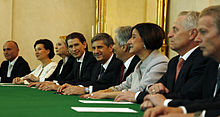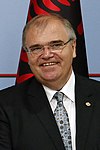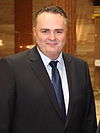Federal government Faymann II
| Federal government Faymann II | |
|---|---|
| 28. Federal Government of the Second Republic of Austria | |

|
|
| Chancellor | Werner Faymann |
| choice | 2013 |
| Legislative period | XXV. |
| Appointed by | Federal President Heinz Fischer |
| education | December 16, 2013 |
| The End | 17th May 2016 |
| Duration | 2 years and 153 days |
| predecessor | Federal government Faymann I |
| successor | Federal government core |
| composition | |
| Party (s) | SPÖ and ÖVP |
| representation | |
| National Council | 99/183 |
The Federal Government Faymann II , a coalition government of the Social Democratic Party of Austria (SPÖ) and the Austrian People's Party (ÖVP), was appointed and sworn in by Federal President Heinz Fischer on December 16, 2013 . For Chancellor was again Werner Faymann (SPÖ), the Vice Chancellor again Michael Spindelegger (ÖVP) appointed. On September 1, 2014, January 26, 2016 and April 21, 2016 the government was reorganized.
On May 9, 2016 Werner Faymann announced his immediate resignation and the withdrawal from all political functions. The Federal President therefore entrusted Vice Chancellor Reinhold Mitterlehner with the continued management of the Federal Chancellor's business on the same day .
With the inauguration of Christian Kern by the Federal President on May 17, 2016 - in the still ongoing legislative period of the National Council - the Faymann government, ministerially unchanged until the day after, was absorbed into the Federal Government of Kern .
Government formation
Despite the losses of both governing parties SPÖ and ÖVP in the 2013 National Council election , the SPÖ was able to hold first place. The SPÖ chairman and former Federal Chancellor Faymann received an order from Federal President Fischer on October 9 to form a government.
The SPÖ would have had an absolute majority in the National Council with the FPÖ : 92 seats, the minimum. Faymann excluded the coalition with the Freedom Party from the start. ÖVP politicians brought a coalition of ÖVP, FPÖ and Team Stronach into play; however, this possibility was not pursued any further. Instead, on October 14, the bodies of the SPÖ and ÖVP approved the start of coalition negotiations with one another.
This took two months, followed skeptically by the media, until Faymann and Spindelegger announced in a press conference on December 12, 2013 that they had drawn up a government program. On the same evening, internal personnel decisions were made.
composition
The SPÖ government team remained largely unchanged in terms of personnel , apart from the departure of Education Minister Claudia Schmied . The Minister for Women Gabriele Heinisch-Hosek , who was previously in the Federal Chancellery , took over the teaching department, to which the women's agendas were transferred on March 1, 2014, whereby the name of the department changed. In return, on the same day, the areas of art and culture were transferred from the previous Ministry of Education to the Federal Chancellery, where Josef Ostermayer had to look after them as the new Minister in the Federal Chancellery .
The ÖVP ministerial team has undergone major changes: Vice Chancellor and former Foreign Minister Michael Spindelegger took over the Ministry of Finance from Maria Fekter, who had left; Sebastian Kurz succeeded him as the new Foreign Minister ; Since March 1, the name of the ministry has also included the integration (of immigrants) that Kurz had previously looked after. The new Minister of Justice acted in place of Beatrix Karl , Professor of Criminal Law Wolfgang Brandstetter , Andrä Rupprechter became Minister of Agriculture and Environment instead of Nikolaus Berlakovich .
The Ministry of Science, previously headed by Karlheinz Töchterle , was integrated into the Ministry of Economic Affairs, which Reinhold Mitterlehner continued to head ; an ÖVP decision that was heavily criticized by the media, against which the SPÖ raised no objection. For the youth and family agendas, which previously belonged to the Ministry of Economic Affairs, the new Federal Ministry for Youth and Family was established on March 1, 2014 under the direction of Sophie Karmasin .
The Federal Ministries Act was amended to address these shifts in competencies. Until this change came into force, the Faymann I government departments continued to exist with their previous competencies. The composition of the government appointed on December 16, 2013 was published on the website of the Federal Chancellery. On January 29, 2014, the National Council voted with the votes of the governing parties to amend the Federal Ministries Act, which came into force on March 1. The opposition unanimously rejected the shift in competencies.
Government reshuffles in 2014 and 2016
After the death of the President of the National Council, Barbara Prammer, on August 2, 2014, it was announced that the previous Minister of Infrastructure, Doris Bures, would succeed her at the head of the National Council. On August 25, 2014, this was decided by the SPÖ party executive, as was the move up of Alois Stöger as infrastructure minister and Sabine Oberhauser as health minister .
Michael Spindelegger announced on August 26, 2014 that he would be stepping down from all government and ÖVP functions. On the same evening, Minister of Economic Affairs Reinhold Mitterlehner was appointed as his successor as designated ÖVP boss and vice chancellor. Mitterlehner announced that he did not want to become finance minister.
On August 31, Hans Jörg Schelling was presented as the new Finance Minister and Harald Mahrer as State Secretary in the Ministry of Economic Affairs. In return, Jochen Danninger vacated his post as State Secretary for Finance. State Secretary Sonja Steßl moved from the Ministry of Finance to the Chancellery in order to be able to represent Chancellor Faymann at parliamentary meetings; this was only possible if she was serving in the Federal Chancellery.
The inauguration of the new ministers took place on September 1, 2014 in the Hofburg.
On January 26, 2016, Rudolf Hundstorfer left the government because he was a candidate for the federal presidential election in spring 2016. The two SPÖ ministers Alois Stöger and Gerald Klug "moved up", Hans Peter Doskozil was newly appointed to the government by Federal President Heinz Fischer .
Another minor government reshuffle took place on April 21, 2016, when Johanna Mikl-Leitner resigned from the government as Minister of the Interior and was replaced by Lower Austrian Finance Officer Wolfgang Sobotka , also from the ÖVP.
Overview
| Office | photo | Surname | Political party | State Secretary | Political party | ||
|---|---|---|---|---|---|---|---|
| Chancellor |
Werner Faymann resigned on May 9, 2016 |
SPÖ | Sonja Steßl from September 1st, 2014 | SPÖ | |||
|
Reinhold Mitterlehner was entrusted with the management from May 9, 2016 |
ÖVP | ||||||
| Vice Chancellor |
Michael Spindelegger until September 1, 2014 |
ÖVP | |||||
|
Reinhold Mitterlehner from September 1, 2014 |
ÖVP | ||||||
| Europe, integration and the outside world | Sebastian Kurz | ÖVP | |||||
| Interior |
Johanna Mikl-Leitner until April 21, 2016 |
ÖVP | |||||
|
Wolfgang Sobotka from April 21, 2016 |
ÖVP | ||||||
| Judiciary | Wolfgang Brandstetter | Non-party (nominated by the ÖVP) | |||||
| Finances |
Michael Spindelegger until September 1, 2014 |
ÖVP | Sonja Steßl until September 1, 2014 | SPÖ | |||
|
Hans Jörg Schelling from September 1, 2014 |
ÖVP | Jochen Danninger from September 1st, 2014 | ÖVP | ||||
| Families and youth | Sophie Karmasin | Non-party (nominated by the ÖVP) | |||||
| Labor, social and consumer protection |
Rudolf Hundstorfer until January 26, 2016 |
SPÖ | |||||
|
Alois Stöger from January 26th, 2016 |
SPÖ | ||||||
| Agriculture, forestry, environment and water management | Andrä Rupprechte | ÖVP | |||||
| National defense |
Gerald Klug until January 26, 2016 |
SPÖ | |||||
|
Hans Peter Doskozil from January 26, 2016 |
SPÖ | ||||||
| Transport, innovation and technology |
Doris Bures until September 1, 2014 |
SPÖ | |||||
|
Alois Stöger until January 26, 2016 |
SPÖ | ||||||
|
Gerald Klug from January 26, 2016 |
SPÖ | ||||||
| Education and women | Gabriele Heinisch-Hosek | SPÖ | |||||
| Science, research and economy | Reinhold Mitterlehner | ÖVP | Harald Mahrer from September 1st, 2014 | ÖVP | |||
| health |
Alois Stöger until September 1, 2014 |
SPÖ | |||||
|
Sabine Oberhauser from September 1, 2014 |
SPÖ | ||||||
| Chancellery Minister for Art, Culture, Constitution and Media | Josef Ostermayer | SPÖ | |||||
Retired members of the government
- Michael Spindelegger , Vice Chancellor and Federal Minister of Finance (until September 1, 2014)
- Doris Bures , Federal Minister for Transport, Innovation and Technology (until September 1, 2014; then President of the National Council)
- Jochen Danninger , State Secretary in the Federal Ministry of Finance (until September 1, 2014)
- Rudolf Hundstorfer , Federal Minister for Labor, Social Affairs and Consumer Protection (until January 26, 2016; candidate for the election of the Federal President in spring 2016)
- Johanna Mikl-Leitner , Federal Minister of the Interior (until April 21, 2016; then Regional Councilor and Deputy Governor in Lower Austria)
- Werner Faymann , Federal Chancellor (until May 9, 2016)
Task reform and deregulation commission
On June 13, 2014, the government set up a Task Reform and Deregulation Commission (ADK). Your task is to develop concepts for an efficient and modern administrative apparatus. The first proposals for implementation should be available by the end of 2014, which should lead to a political discussion and ultimately to decisions and resolutions. A first report by the ADK was published in September 2014.
The commission is headed by the two chairmen Rudolf Thienel and Clemens Jabloner . There are a further twelve members, including two women entrepreneurs, several section heads from various ministries (including Manfred Matzka and Matthias Tschirf ) and the regional office directors of Burgenland, Lower Austria, Salzburg and Vienna.
Web links
- Declaration of resignation from Werner Faymann (accessed on May 9, 2016)
Individual evidence
- ^ Announcement on orf.at from December 16, 2013
- ↑ Chancellor Faymann resigns ORF on May 9, 2016, accessed on May 9, 2016
- ↑ SPÖ and ÖVP bodies agreed on coalition negotiations. In: derStandard.at. October 14, 2013, accessed December 3, 2017 .
- ^ What is in the government program of the SPÖ and ÖVP. In: derStandard.at. December 12, 2013, accessed December 4, 2017 .
- ^ Minister carousel among the blacks , Kurier, December 12, 2013
- ↑ Government: Fischer wants the Ministry of Science. Salzburger Nachrichten, December 13, 2013.
- ↑ Fischer: "I would have liked the Ministry of Science". The press, December 13, 2013.
- ^ News magazine profil , No. 51, December 16, 2013, p. 40
- ↑ List of ministers from December 16, 2013 on the website of the Federal Chancellery ( Memento from December 24, 2013 in the Internet Archive )
- ↑ Amendment to the Federal Ministries Act 2014 - approved changes at help.gv.at, accessed on February 8, 2014
- ↑ Report by the ORF on its website, August 26, 2014
- ↑ Mitterlehner takes over the ÖVP. Die Presse, August 26, 2014 (online, print August 27)
- ^ Tiroler Tageszeitung: "ÖVP chairman number 16 and vice chancellor number 19" , accessed on March 11, 2020
- ↑ Mitterlehner does not become finance minister. August 27, 2014, accessed August 27, 2014 .
- ↑ Karin Riss, Markus Rohrhofer: Black reorganization: "The conversion is complete". In: derStandard.at. August 31, 2014, accessed August 31, 2014 .
- ↑ Chancellor wants a representative. In: derStandard.at. August 31, 2014, accessed September 1, 2014 .
- ^ Website of the Task Reform and Deregulation Commission



















